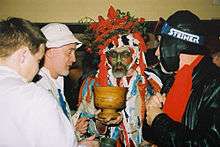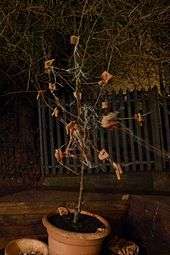Wassailing
The tradition of wassailing (alt sp wasselling)[1] falls into two distinct categories: The house-visiting wassail and the orchard-visiting wassail. The house-visiting wassail is the practice of people going door-to-door, singing and offering a drink from the wassail bowl in exchange for gifts. This practice still exists, but has largely been displaced by caroling.[2] The orchard-visiting wassail refers to the ancient custom of visiting orchards in cider-producing regions of England, reciting incantations and singing to the trees to promote a good harvest for the coming year.[3]
Etymology
The word wassail comes from the Anglo-Saxon greeting Wæs þu hæl, meaning "be thou hale"—i.e., “be in good health”. The correct response to the greeting is Drinc hæl.[4][5] According to the Oxford English Dictionary waes hael is the Middle English (and hence post-Norman) spelling parallel to OE hál wes þú, and was a greeting not a toast.[5]
The American Heritage Dictionary, fifth edition, gives Old Norse ves heill as the source of Middle English waeshaeil.[6] However the Oxford English Dictionary explicitly rejects this, saying "neither in Old English nor in Old Norse, nor indeed in any Germanic language, has any trace been found of the use as drinking formulas".[5]
Later, in the twelfth century, Danish-speaking inhabitants of England turned "was hail", and the reply "drink hail", into a drinking formula, a toast, adopted widely by the indigenous population of England.[7][5] In recent times, the toast has come to be synonymous with Christmas.
Wassailing and Yulesinging
Traditionally, the wassail is celebrated on Twelfth Night (variously on either January 5 or 6). Some people still wassail on "Old Twelvey Night", January 17, as it would have been before the introduction of the Gregorian Calendar in 1752.[4]
In the middle ages, the wassail was a reciprocal exchange between the feudal lords and their peasants as a form of recipient-initiated charitable giving, to be distinguished from begging. This point is made in the song "Here We Come A-Wassailing", when the wassailers inform the lord of the house that
we are not daily beggars that beg from door to door
But we are friendly neighbours whom you have seen before.
The lord of the manor would give food and drink to the peasants in exchange for their blessing and goodwill, i.e.
Love and joy come to you,
And to you your wassail too;
And God bless you and send you
a Happy New Year
This would be given in the form of the song being sung. Wassailing is the background practice against which an English carol such as "We Wish You a Merry Christmas" dating back to sixteenth century England, can be made sense of.[8] The carol lies in the English tradition where wealthy people of the community gave Christmas treats to the carolers on Christmas Eve such as 'figgy puddings'.[9]
Although wassailing is often described in innocuous and sometimes nostalgic terms - still practiced in some parts of Scotland and Northern England on New Years Day as "first footing", the practice in England has not always been considered so innocent. Similar traditions have also been traced to Greece and the country of Georgia. Wassailing was associated with rowdy bands of young men who would enter the homes of wealthy neighbours and demand free food and drink (in a manner similar to the modern children's Halloween practice of trick-or-treating).[10] If the householder refused, he was usually cursed, and occasionally his house was vandalized. The example of the exchange is seen in their demand for "figgy pudding" and "good cheer", i.e., the wassail beverage, without which the wassailers in the song will not leave; "We won't go until we get some, so bring some out here".[9]
The orchard-visiting Wassail
In the cider-producing West of England (primarily the counties of Devon, Somerset, Dorset, Gloucestershire and Herefordshire) wassailing also refers to drinking (and singing) the health of trees in the hopes that they might better thrive.
An old rhyme goes:
Wassaile the trees, that they may beare
You many a Plum and many a Peare:
For more or lesse fruits they will bring,
As you do give them Wassailing.
The purpose of wassailing is to awake the cider apple trees and to scare away evil spirits to ensure a good harvest of fruit in the Autumn.[11] The ceremonies of each wassail vary from village to village but they generally all have the same core elements. A wassail King and Queen lead the song and/or a processional tune to be played/sung from one orchard to the next, the wassail Queen will then be lifted up into the boughs of the tree where she will place toast soaked in Wassail from the Clayen Cup as a gift to the tree spirits (and to show the fruits created the previous year). Then an incantation is usually recited such as
Here's to thee, old apple tree,
That blooms well, bears well.
Hats full, caps full,
Three bushel bags full,
An' all under one tree.
Hurrah! Hurrah!
Then the assembled crowd will sing and shout and bang drums and pots & pans and generally make a terrible racket until the gunsmen give a great final volley through the branches to make sure the work is done and then off to the next orchard. Perhaps unbeknown to the general public, this ancient English tradition is still very much thriving today. The West Country is the most famous and largest cider producing region of the country and some of the most important wassails are held annually in Carhampton and Dunster (Somerset) and Whimple and Sandford (Devon), all on 17 January (old Twelfth Night).
Clevedon (North Somerset) holds an annual Wassailing event in the popularly attended Clevedon Community Orchard, combining the traditional elements of the festival with the entertainment and music of the Bristol Morris Men and their cantankerous Horse.
Private readings about people in Somerset in the 1800s revealed that inhabitants of Somerset practised the old Wassailing Ceremony, singing the following lyrics after drinking the cider until they were "merry and gay:"
Apple tree, apple tree, we all come to wassail thee,
Bear this year and next year to bloom and to blow,
Hat fulls, cap fulls, three cornered sack fills,
Hip, Hip, Hip, hurrah,
Holler biys, holler hurrah.— [12]
A folktale from Somerset reflecting this custom tells of the "Apple Tree Man", the spirit of the oldest apple tree in an orchard, and in whom the fertility of the orchard is said to reside. In the tale a man offers his last mug of mulled cider to the trees in his orchard and is rewarded by the Apple Tree Man who reveals to him the location of buried treasure.[13][14]
Wassail bowls

Wassail bowls, generally in the shape of goblets, have been preserved. The Worshipful Company of Grocers made a very elaborate one in the seventeenth century, decorated with silver.[15] It is so large that it must have passed around as a "loving cup" so that many members of the guild could drink from it.
In the British Christmas carol "Wassail, Wassail, All Over the Town", the singers tell that their "bowl is made of the white maple tree, with a wassailing bowl we'll drink to thee". White maple is a completely flavorless wood, commonly used even today to make some kitchen utensils, and likely was what many simple peasant wassail bowls were made from. Variants may be sung where the Wassail bowl is made of other woods, e.g. "Sycamore tree", "grand old Oak tree", and so on.
There are surviving examples of "puzzle wassail bowls", with many spouts. As you attempt to drink from one of the spouts, you are drenched from another spout. The drink was either punch, mulled wine or spicy ale.
See also
References
- Oxford English Dictionary
- Merriam-Webster Online Dictionary "wassail."
- Birmingham Museums & Art Gallery Wassail Bowl
- "Reminiscences of Life in the parish of Street, Somersetshire dated 1909 at pages 25-26 written by an "old inhabitant" William Pursey of Street 1836-1919. This is the art of wassail.
Notes
- ↑ Sussex Entymology Doreathea Hurst, History and Antiquities of Horsham,Farncombe & Co, 1889
- ↑ Kvamme, Torstein O. (1935). The Christmas Carolers' Book in Song & Story. Alfred Music. p. 6.
- ↑ Palmer, K.; Patten, R. W. (December 1971). "Some Notes on Wassailing and Ashen Faggots in South and West Somerset". Folklore. 82 (4): 281–291. doi:10.1080/0015587X.1971.9716741.
- 1 2 "Wassailing! - Notes On The Songs And Traditions". www.hymnsandcarolsofchristmas.com. Retrieved 7 January 2016.
- 1 2 3 4 "Oxford English Dictionary". www.oed.com.
- ↑ "The American Heritage Dictionary entry: wassail". www.ahdictionary.com. Retrieved 7 January 2016.
- ↑ http://www.history.org/Foundation/journal/Holiday06/wassail.cfm
- ↑ We Wish You a Merry Christmas Lyrics
- 1 2 English Christmas Carols - Christmas Songs of England
- ↑ Matt Crenson (22 December 2006). "Take Cheer: Christmas has Been Out of Control for Centuries". AP.
- ↑ Sue, Clifford; Angela, King (2006). England in Particular: A Celebration of the Commonplace, the Local, the Vernacular and the Distinctive. Saltyard Books. p. 528. ISBN 978-0340826164.
- ↑ "Reminiscences of Life in the parish of Street, Somersetshire dated 1909 at pages 25-26 written by an "old inhabitant" William Pursey of Street 1836-1919. This is the art of wassail.
- ↑ Briggs, Katharine, Encyclopedia of Fairies, 1976, pp. 9-10
- ↑ Briggs, Katharine and Tongue, Ruth, Folktales of England, 1965, p. 44
- ↑ http://www.bmagic.org.uk/objects/1965T391 Birmingham Museums & Art Gallery
External links
| Wikimedia Commons has media related to Wassail. |
